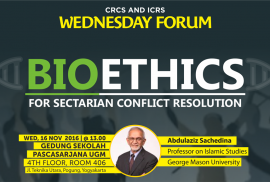
Abstract
Although secular bioethics avoids any entanglement with religious issues, bioethics has the goal of advancing the relationship between the physician, the patient and the patient’s family in medical practice and research, even in tense moments of disagreements in the clinical situation. My involvement in Islamic bioethics, which asserts principles like asserting that bio-ethical principles like “No harm, no harassment” and maslaha or public interest, makes me confident in asserting that two universal principles, which are already operative in the healthcare institutions around the world, can establish peaceful coexistence between members of various communities. These are the value that demands acknowledgment of human equality based in inherent human dignity and the value that teaches humans to relate to one another in sincerity, sensitivity, and a deep sense of sacrifice. I argue they must be applied across all levels of interpersonal relations and interactions.
Speaker
Abdulaziz Sachedina, Ph.D., is Professor and IIIT Chair in Islamic Studies at George Mason University in Fairfax, Virginia. Dr. Sachedina, who has studied in India, Iraq, Iran, and Canada, obtained his Ph.D. from the University of Toronto. He has been conducting research and writing in the field of Islamic Law, Ethics, and Theology (Sunni and Shiite) for more than two decades. In the last ten years he has concentrated on social and political ethics, including Interfaith and Intra-faith Relations, Islamic Biomedical Ethics and Islam and Human Rights.
Arsip:


